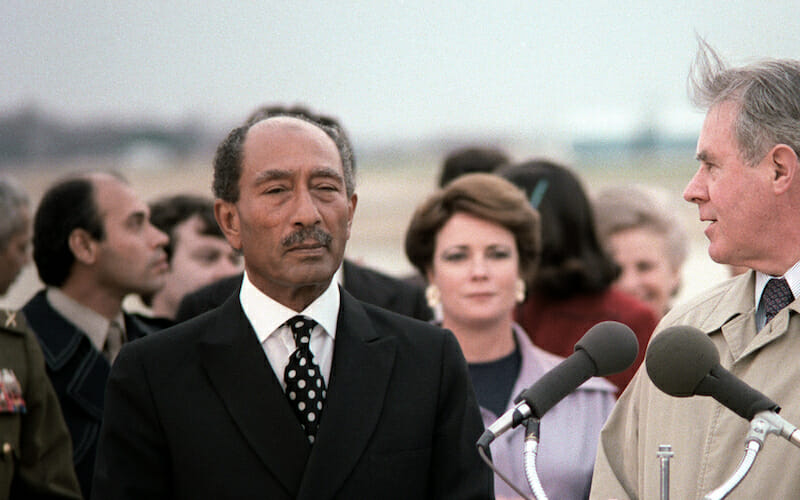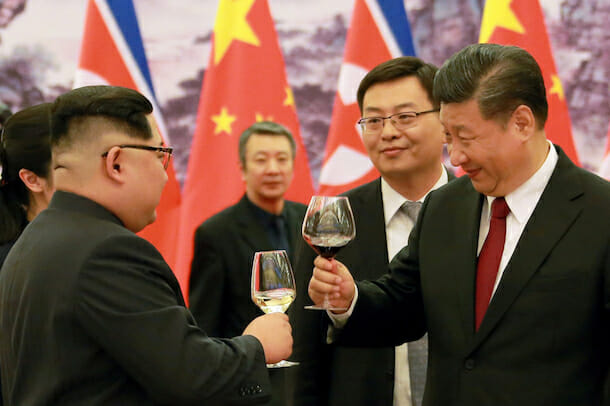
From Anwar Sadat’s Egypt to Kim Jong-Un’s North Korea. How Alliances Mutate
“In politics, there are no permanent friends or permanent enemies, only permanent interests.” This often-quoted dictum (attributed to 19th century British statesman Lord Palmerston) has proved its validity in the realm of international relations. The fugacity of alliances and of enmities is indeed a phenomenon that the world has witnessed umpteen times.
A turnaround of this nature that modified in no small measure the Cold-War balance of forces, in particular in the Middle East (and which was largely unanticipated by mainstream foreign-policy experts), was the one operated by Egypt in the 1970s after the demise of its ruler Gamal Abdel Nasser. From an “indestructible partnership” with the Soviet Union under Nasser, Egypt’s regime, then headed by his successor, Anwar Sadat, decided to get closer to the U.S. and to play the reconciliation card vis-à-vis America’s crucial ally in the region, namely Israel.
Economic reasons were at the root of that U-turn. Egypt was crumbling under the weight of the gigantic debt it owed to the USSR as a result of the USSR supply of costly, sophisticated weaponry and of its financing of the construction of the economically-unprofitable (and ecologically-disastrous) Aswan Dam. A point had been reached at which Egypt couldn’t continue to service that debt (payment of interests and loans arrived at maturity). The Soviet Union, on its part, looked with suspicion Sadat’s initial moves toward improving relations with the U.S. and, accordingly, refused to reschedule, let alone condone, Egypt’s debt.
Geopolitical issues were at play as demonstrated by the role in Egypt’s change of course. Soviet patronage was increasingly regarded by Sadat, not as an asset, but as a liability, if only because it collided with his attempts to repair relations with the U.S.
Considerations of a similar (though not identical) nature are behind the incipient – and still fragile – thaw in the relations between North Korea and the U.S.
Economic considerations first. More than Egypt in the 1970s, North Korea has its economy in shatters, the cause being, not a mounting foreign debt, but the catastrophic results produced by socialism. Kim Jong-Un seems to be intent on tackling that problem. He has given greater weight to economic policy makers within North Korea’s power structure and, in a speech delivered last April, formulated a “new strategic line” that puts the emphasis on a market-oriented promotion of economic development.
Furthermore, as was the case of Egypt vis-à-vis the USSR, uneasiness is not absent in the relations between North Korea and its Chinese protector.
The strains in China-North Korea relations have not gone unnoticed. As stated by Andrei Lankov, director of the Korea Risk Group: “China and North Korea don’t see each other with any kind of mutual sympathy. There are zero warm feelings between the two countries.” In the same line of thought, Oriana Skylar Mastro, at Georgetown University, points out: “Over the last two decades, Chinese relations with North Korea have deteriorated drastically behind the scenes.”
That helps explain the fact that the North Korean dictator – who has been in power since 2011 – hadn’t paid a single visit to China’s president Xi Jinping until the two trips he made to Beijing in March and May this year ahead of the Trump-Kim summit in Singapore. The lack of personal contacts between these two leaders supports the belief that their relations may not be as warm as mainstream political analysts assume they are.
Seen from this perspective, Kim’s recent travels to Beijing may not necessarily be due to a warming of relations between the leaders of the two countries, but rather, to an attempt by North Korea’s ruler to assuage Xi Jinping’s eventual apprehensions about the get together between Kim and Donald Trump in Singapore and help China’s regime to claim – as that country’s media hastened to assert in the wake of Kim’s travels – that North Korea’s denuclearization “is indeed inseparable from China’s efforts.”

Another symptom of the discomfort that may be hiding behind the façade of perfect comradeship between China and North Korea relates to the fact that Kim got rid of, through homicide, the person who reportedly had acted as the main liaison between Pyongyang and Beijing. That person was no other than Kim’s uncle, Jang Song-thaek.
Kim Jong-Un arguably can be disgruntled with a so-called ally, i.e. China, that did not use its veto power at the UN Security Council to prevent the imposition of international sanctions against Pyongyang. He would logically prefer to fly with his own wings and have an autonomous, emancipated role in the international arena. Hence his attempts to seek a deal with the U.S.
There is one further reason for Kim trying to mend relations with the U.S. If he envisages (as seems to be the case) to open North Korea to the globalized world economy and promote an export-led development, he can only feel disquiet about China’s intention to seize control over large swaths of the South China Sea and about the constraints on freedom of navigation that such control may entail. On this issue, North Korea’s position is likely to resemble that of Vietnam: both have a long-standing anti-American record, and yet, both may welcome a U.S. involvement in thwarting China’s designs in those waters.
Furthermore, a thaw in U.S.-North Korea relations is made all the more possible by Kim Jong-Un’s recent initiatives to bury the hatchet against U.S.-protected South Korea. Here, too, the resemblance with 1970s Egypt is noticeable: mending relations with the U.S. main ally in the Middle East, namely Israel, was – let’s recall – the sine qua non condition for the U.S. to agree to the rapprochement sought by Sadat.
So much for the similarities between Egypt in the 1970s and today’s North Korea. Now the difference. A big one indeed. Here it is.
Egypt managed to switch alliances, without being crushed by its Soviet “protector,” because it was not located in the periphery of the USSR. Moscow would surely not have tolerated a similar, upsetting turnaround had it erupted in its backyard (think of Soviet tanks entering into Hungary, Poland or Czechoslovakia).
North Korea, on its part, is too close to China to envisage antagonizing Beijing. The most that China would be prepared to accept near its border is a sort of Finlandization of North Korea – and for that matter of the entire Korean peninsula.
Such a setup, with the withdrawal of U.S. troops from South Korea that it would entail, has appetizing advantages for China: without U.S. troops in the peninsula, Beijing could fully devote its military means and diplomatic ingenuity to the attainment of its two most cherished geopolitical objectives, namely the so-called “reunification with Taiwan” and the control of the South China Sea.
Correspondingly, without having to station troops in South Korea, the U.S. would be able to concentrate efforts on countering China’s aforementioned two priority objectives.
All things considered, the presence of U.S. troops in South Korea is a relic of the Cold War that, back in the 1970s, Jimmy Carter tried to get rid of before being dissuaded, or stymied, by the so-called experts in command of Foggy Bottom at that time.
The Finlandization of Korea would also suit Kim Jong-Un. To trade his country’s denuclearization (whatever that may ultimately mean) in exchange of regime recognition and massive economic oxygen (lifting of sanctions, foreign investment and development aid) is too tempting a tack for North Korea’s ruler to discard.
For all these reasons, a thaw in U.S.-North Korea relations is far from being a nonsensical hypothesis. This is so much the case that Tong Zhao, at the Carnegie-Tsinghua Center at Beijing, has ventured to affirm: “There is even an extreme concern within the strategic Chinese community that maybe the U.S. will accept a nuclear capable North Korea as its ally, or at least a friendly country.” In an op-ed published at The National Interest, foreign-policy scholars Hongyu Zhang and Kevin Wang go further still and contend that it is in the interest of the U.S. that North Korea stays nuclear so that the latter can play the role of stabilizer vis-à-vis China.
To deride those who, in the early 20th century, had wrongfully ruled out the viability of a Soviet takeover of Russia, Communist leader Leon Trotsky coined a caustic sentence that has become famous: “The revolution [always] seems impossible until it proves to be inevitable.” Substitute the words “alliance-reshuffling” for “revolution,” and then the sentence helps understand why Egypt’s realignment in the 1970s was largely unanticipated by mainstream pundits – and also why today’s pundits tend to dismiss the viability of an entente (fragile and fugacious as any international entente may be) between North Korea and the U.S.

